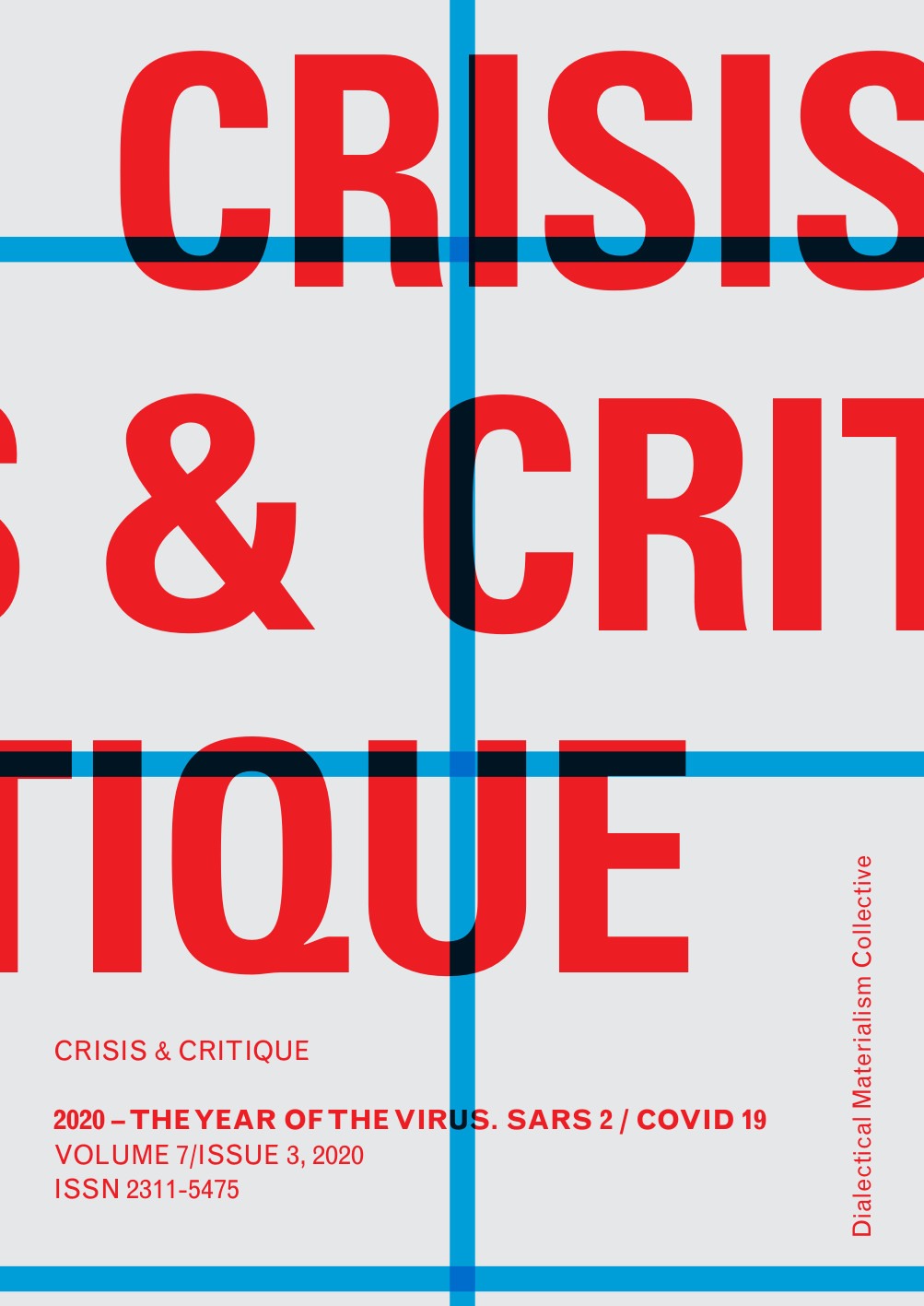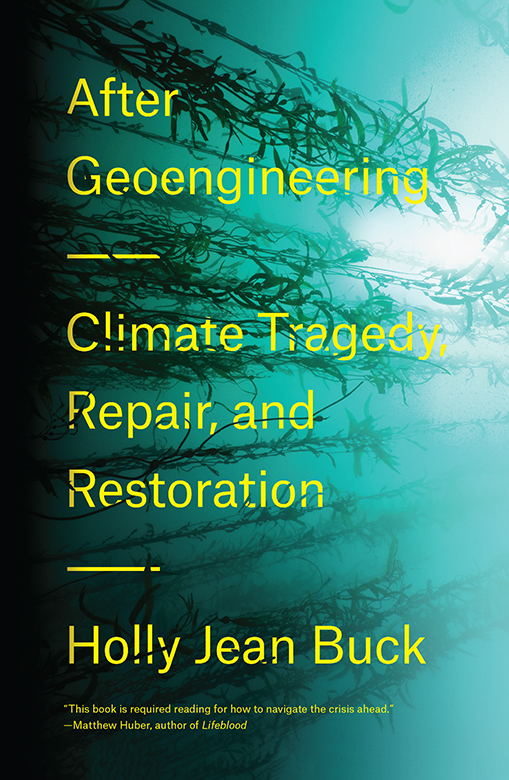Crisis & Critique 7(3): 2020 – The Year of the Virus. SARS 2 / COVID 19 (2020)
Filed under journal | Tags: · biopolitics, climate crisis, critique, necropolitics, pandemic, philosophy, politics, theory, virus

“The present issue of Crisis and Critique brings together an array of thinkers who all in their singular way deal with the effects of the virus, with how the pandemic was registered, with its resonances, with what kind of problems it potentially made visible or what kind of issues it brought to the fore, including the narcissistic tendency of “theory”, broadly speaking itself.”
Contributors: Étienne Balibar, Andrea Cavalletti, Justin Clemens, Alexander García Düttmann, Roberto Esposito, Isabelle Garo, Bue Rübner Hansen, Wang Hui, Elena Louisa Lange and Joshua Pickett-Depaolis, Álvaro García Linera, Michael Löwy, Artemy Magun & Michael Marder, Catherine Malabou, Todd McGowan, Warren Montag, Jean-Luc Nancy, Nick Nesbitt, Michael Roberts, Kim Stanley Robinson, Natalia Romé, Vladimir Safatle, Göran Therborn, Alberto Toscano, Gabriel Tupinambá et al, Raquel Varela & Roberto della Santa, Fabio Vighi, Sophie Wahnich, Slavoj Žižek, Mladen Dolar, Agon Hamza and Frank Ruda.
Edited by Agon Hamza & Frank Ruda
Publisher KMD (Kolektivi materializmi dialektik), Prishtina, November 2020
Open access
ISSN 2311-5475
502 pages
Cymene Howe, Anand Pandian (eds.): Anthropocene Unseen: A Lexicon (2020)
Filed under book | Tags: · anthropocene, climate, climate crisis, earth, environment, theory
![]()
“The idea of the Anthropocene often generates an overwhelming sense of abjection or apathy. It occupies the imagination as a set of circumstances that counterpose individual human actors against ungraspable scales and impossible odds. There is much at stake in how we understand the implications of this planetary imagination, and how to plot paths from this present to other less troubling futures. With Anthropocene Unseen: A Lexicon, the editors aim at a resource helpful for this task: a catalog of ways to pluralize and radicalize our picture of the Anthropocene, to make it speak more effectively to a wider range of contemporary human societies and circumstances. Organized as a lexicon for troubled times, each entry in this book recognizes the gravity of the global forecasts that invest the present with its widespread air of crisis, urgency, and apocalyptic possibility. Each also finds value in smaller scales of analysis, capturing the magnitude of an epoch in the unique resonances afforded by a single word.
The Holocene may have been the age in which we learned our letters, but we are faced now with circumstances that demand more experimental plasticity. Alternative ways of perceiving a moment can bring a halt to habitual action, opening a space for slantwise movements through the shock of the unexpected. Each small essay in this lexicon is meant to do just this, drawing from anthropology, literary studies, artistic practice, and other humanistic endeavors to open up the range of possible action by contributing some other concrete way of seeing the present. Each entry proposes a different way of conceiving this Earth from some grounded place, always in a manner that aims to provoke a different imagination of the Anthropocene as a whole.
The Anthropocene is a world-engulfing concept, drawing every thing and being imaginable into its purview, both in terms of geographic scale and temporal duration. Pronouncing an epoch in our own name may seem the ultimate act of apex species self-aggrandizement, a picture of the world as dominated by ourselves. Can we learn new ways of being in the face of this challenge, approaching the transmogrification of the ecosphere in a spirit of experimentation rather than catastrophic risk and existential dismay? This lexicon is meant as a site to imagine and explore what human beings can do differently with this time, and with its sense of peril.”
Publisher Punctum Books, February 2020
Creative Commons BY-NC-SA 4.0 International License
ISBN 9781950192557
540 pages
PDF, PDF (218 MB)
Earlier online edition (2016-2017)
Holly Jean Buck: After Geoengineering: Climate Tragedy, Repair, and Restoration (2019)
Filed under book | Tags: · climate, climate crisis, environment, geoengineering, geography, technology

“What if the people seized the means of climate production?
The window for action on climate change is closing rapidly. We are hurtling ever faster towards climate catastrophe—the destruction of a habitable world for many species, perhaps the near-extinction of our own. As anxieties about global temperatures soar, demands for urgent action grow louder. What can be done? Can this process be reversed? Once temperatures rise, is there any going back? Some are thinking about releasing aerosols into the stratosphere in order to reflect sunlight back into space and cool the earth. And this may be necessary, if it actually works. But it would only be the beginning; it’s what comes after that counts.
In this groundbreaking book, Holly Jean Buck charts a possible course to a liveable future. Climate restoration will require not just innovative technologies to remove carbon from the atmosphere, but social and economic transformation. The steps we must take are enormous, and they must be taken soon. Looking at industrial-scale seaweed farms, the grinding of rocks to sequester carbon at the bottom of the sea, the restoration of wetlands, and reforestation, Buck examines possible methods for such transformations and meets the people developing them.
Both critical and utopian, speculative and realistic, After Geoengineering presents a series of possible futures. Rejecting the idea that technological solutions are some kind of easy workaround, Holly Jean Buck outlines the kind of social transformation that will be necessary to repair our relationship to the earth if we are to continue living here.”
Publisher Verso Books, London and New York, 2019
ISBN 9781788730365, 1788730364
vi+281 pages
Reviews: Heather Davis (The Avery Review, 2020), Elizabeth Garbee (Issues in Sci and Tech, 2020), Karen S. Kinslow (Antipode, 2021), Sam Mulopulos (PoLAR, 2021), Justin Reynolds (New Socialist, 2020), Jason Rhys Parry (Hong Kong Review of Books, 2020), Jonathan Symons (Renewal, 2020), Gabriel Levy (Geoengineering Monitor, 2019).
Comment (1)
